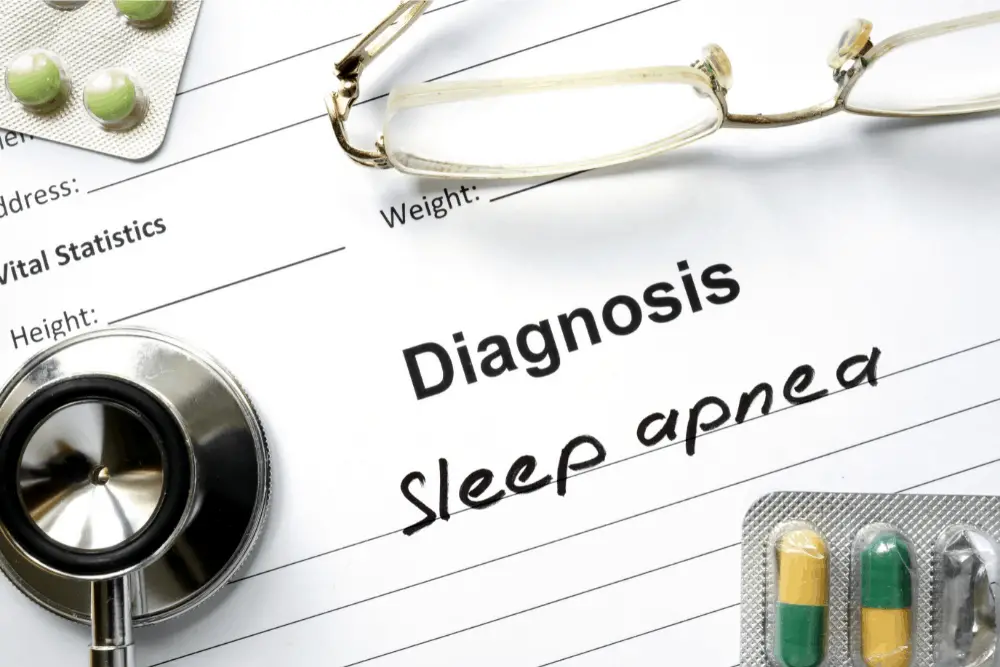The serious sleep disorder, sleep apnea can interrupt a person’s breathing pattern. If it goes untreated, a sufferer could stop breathing repeatedly during their sleep, sometimes hundreds of times a night. This lack of sleep can directly impact the brain as it doesn’t get enough oxygen which can lead to the potential risk of a stroke.
Studies into sleep apnea can show important information about the patient’s oxygen levels as well as the number of breathing stoppages.
One of the main forms of this condition is obstructive sleep apnea or OSA. This occurs when there is a blockage in the airflow through the throat while the person sleeps. Most of the time, the blockage is due to the upper airways collapsing during sleep. When this takes place, breathing can stop for 10 seconds and, in some cases, over a minute.
During these episodes of apnea, people receive less air which decreases the oxygen delivery to the whole body. Oxygen levels within the blood can fall and lower dramatically and repeatedly. This decrease in oxygen is known as oxygen desaturation.
Low oxygen levels, while you sleep, can make you feel extremely lethargic the next day and generally contributes to a restless night’s sleep. Also, as the oxygen levels begin to drop, carbon dioxide levels start to build up in the blood. This can lead to some of the main symptoms of sleep apnea such as morning headaches, fatigue, and drowsiness during the day.
If you have any symptoms of this condition, you should consult your doctor. They may perform some tests and send you to a sleep clinic to understand how severe your sleep apnea may be. A course of treatment will then be decided depending on the level of your condition.
Oxygen levels can lower by 3% or 4%, and in some patients much more. If oxygen levels dip below 88%, this is deemed to be severely abnormal and very dangerous. When a person’s oxygen levels remain low for more than five minutes during sleep, this is known as hypoxemia.
It is worth noting that your brain can only survive 4 minutes once oxygen is completely cut off. Therefore, severe sleep apnea must be treated as soon as possible to prevent a whole host of health problems such as brain damage, stroke, and blood clots.
Can sleep apnea cause low oxygen levels during the day?
As the name suggests, sleep apnea only occurs as you sleep but its effects can be felt afterward. However, nighttime sleep apnea does not directly have any effect on daytime oxygen levels.
Most of the time, if a person’s daytime oxygen levels are low, it points toward another issue that should be discussed with a medical professional. That being said, undiagnosed and untreated sleep apnea can contribute to many health issues that may affect daytime functioning.
Central sleep apnea is one form of this condition. Unlike obstructive sleep apnea, central sleep apnea stems from the brain not sending the correct signals for your body to breathe whereas obstructive sleep apnea is caused by a physical obstruction to the airway. Central sleep apnea is much rarer than OBA and some sufferers can experience symptoms while awake.
Central sleep apnea patients tend to have too much carbon dioxide in their blood. This results in certain side effects such as difficulty breathing throughout the day. The root cause of this problem is a malfunctioning brainstem as well as lower carbon dioxide levels.
Though oxygen levels may be lower during the day with this form of sleep apnea, the most severe symptoms occur during the night. This is because the autonomic nervous system works differently during waking hours than during sleep.
Sufferers of central sleep apnea can experience daytime sleepiness and severe headaches because of their interrupted sleep cycles. Such symptoms and signs should not be taken lightly. These are usually a direct link to a serious sleep disorder that needs medical attention.
Monitoring your daytime oxygen levels can correspond to your nighttimes levels. If your doctor finds that your blood oxygen level, or oxygen saturation, is less than around 90% during the daytime, it usually means that your oxygen levels during the night as you sleep are dropping too. If this is the case, it potentially means that you have sleep apnea or other respiratory disorders.
If your body suffers long-term low oxygen levels, it can lead to heart rhythm problems, a build-up of fluid in the body, an increase in pressure on the right side of your heart, heart failure, and stroke.
Those with low oxygen levels may have to seek treatment with CPAP machines. These monitor the number of apnea events during your sleep and discover the severity and cause of your low oxygen levels. If apnea events disappear, then oxygen levels will improve and reach normal, healthy levels again.

Damon Wiseley is a Registered Respiratory Therapist and Certified Pulmonary Function Technologist.
